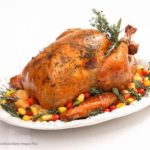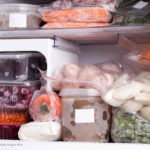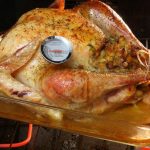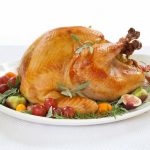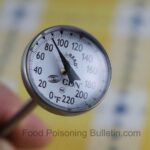The FDA has released a guidance document for food delivery services that is designed to ensure that food ordered online or over the phone is safe to eat. The parameters cover proper packaging, temperature control, verification practices, receiving and storage, and controls for physical contamination and allergen control. The FDA coordinated with the USDA and the CDC to produce this document. The New Era of Smarter Food Safety blueprint identified the safety of foods ordered online and delivered directly to consumers as a priority. Since the pandemic there has been a huge increase of food ordered from retailers. The food includes produce and meal-kit subscription services, food from ghost kitchens, grocery stores, and third-party delivery services. The "last mile" of delivery is … [Read more...]
New Ozone Marinade Kills Pathogens on Meat and Surfaces
A new ozone marinade kills pathogens on meat and food contact surfaces, according to research from the ARS Meat Safety and Quality research Unit. Microbiologists Mick Bosilevac and Nor Kalchayanand, along with food technologist Tommy Wheeler, conducted the research about spraying beef and pork carcasses with an ozone solution. The "marinade" is applied at meat processing plants. Bosilevac said in a statement, "This project was part of a large farm-to-fork project that focused on cattle and swine, following them through harvest and concluding with finished beef and pork products ready for consumers. During harvest we improved on many processes to help reduce contamination." Beef and pork are often contaminated with pathogens that include E. coli, Listeria monocytogenes, and … [Read more...]
Treat Plant-Based Meat Like the Real Meat For Safety’s Sake
You should treat plant-based meat like the real thing for safety's sake, according to the USDA. Many people think that "burgers" made with plants are automatically safer to eat, but that's not the case. Plants can harbor pathogens and, in fact, have made many people sick over the years. In fact, according to a 2015 study conducted by Center for Science in the Public Interest, produce was the most common source of food poisoning. Produce can be contaminated by agricultural water used for irrigation, by animals and birds defecating in the fields, by contaminated harvesting equipment and storage bins, and through handling after harvest. Any raw agricultural product has the potential to be contaminated. And plant-based meats are "ultra processed," according to John Luchansky, lead … [Read more...]
Serve Safe Turkey and Stuffing This Holiday Season
During the holidays, one of the most often prepared recipes is turkey and stuffing. This tradition is delicious, but fraught with potential problems, especially for beginning cooks. Clemson University offers tips on how to prepare this type of recipe and how to serve safe turkey and stuffing. Most food safety experts recommend that you do not stuff your turkey. If the stuffing isn't completely cooked to 165°F it can contain live pathogenic bacteria, since the turkey acts as an insulator and it's difficult to heat the stuffing in the very center. This may disappoint people, since stuffing cooked inside the bird is moist and well flavored from the turkey itself. But you can replicate that taste and texture by simply drizzling turkey stock over the dressing in a casserole, and … [Read more...]
Get Holiday Food Safety Tips From the FDA
It's the holiday season, which means that people are cooking more and hosting parties and gatherings. But this may be the first time cooking for a large group for you. In that case, these holiday food safety tips from the FDA will help. If you don't understand food safety, the risk that someone will get sick from how you handle food increases. The possibility of cross-contamination, undercooked, and improper chilling and reheating exists every time you are in the kitchen. Learning these rules is especially important if you have anyone at your gathering who is at higher risk for serious complications from food poisoning, including the elderly, young children, pregnant women, and those with chronic illnesses and compromised immune systems. It's important to know the four basic food … [Read more...]
Thanksgiving Leftovers Must Be Discarded or Frozen Today
It's now four days after Thanksgiving, and that means that all leftovers from that holiday dinner must be discarded or frozen today, according to the USDA. Of course, this is assuming that you refrigerated that food promptly - within two hours of it coming out of the fridge or oven. Between the temperature range of 40°F to 140°F, bacteria numbers can double in foods every 20 minutes. And those pathogens can make toxins that aren't destroyed by heat. So even if you thoroughly reheat leftovers to 165°F, as you should every time, you may still get sick. That's why we stress prompt refrigeration of perishable foods, including meats, egg dishes, seafood, poultry, casseroles, and cooked vegetables. To freeze foods, store them in freezer bags or other containers in relatively small … [Read more...]
Unsafe Ways to Prepare Your Thanksgiving Turkey
Did you know that there are unsafe ways to prepare your Thanksgiving turkey? While we have covered prepping and cooking the turkey safely, including proper thawing and roasting to the correct temperature, there are other physical parts to the preparation to think about. First of all, the method you use for cooking your turkey is important. You can roast the turkey, grill it, or deep fry it. Roasting is the most common method, and it is the safest, both in terms of food safety and physical safety. Grilling is the next safest, as long as you keep an eye on the bird, understand the risks of grilling such as fire and burns, and use a food thermometer. Just never use a grill in a covered area, not even a breezeway or the garbage because you risk carbon monoxide poisoning. But deep … [Read more...]
Learn How to Safely Prepare a Turkey For Thanksgiving
Thanksgiving is Thursday! Most people will be having turkey and stuffing. Read on to learn how to safely prepare a turkey for Thanksgiving dinner. While this task isn't difficult, there are some rules you should follow to avoid food poisoning. The Centers for Disease Control and Prevention (CDC) has tips. First, plan ahead. If you buy a frozen turkey it needs time to thaw - in the refrigerator. Never thaw a turkey on the counter or you are inviting trouble. Allow 24 hours of thawing for every four to five pounds of bird. If you have a big turkey, it may be too late at this point. In that case, you still have options. You can thaw the turkey in cold water, but you have to keep an eye on it. Make sure the turkey is in a leakproof bag before you put it in the sink. Add cold water … [Read more...]
Thanksgiving Food Safety Tips From the USDA
Thanksgiving food safety tips from the USDA will help you keep your family and friends safe as you celebrate the holiday this year. Follow the basic four steps to food safety - clean, separate, cook, and chill. But there are other tips you need to keep in mind. Handwashing is the first step to avoiding any foodborne illness. Wash your hands with soap and water for at least 20 seconds before you start preparing food, after using the bathroom, and before serving food and eating. Also wash your hands after you handle raw meat, poultry, fish, seafood, and eggs. Avoid cross-contamination by cleaning and sanitizing any surfaces that have touched raw turkey and its juices. That includes counters, sinks, stoves, tabletops, utensils, and plates. Also use separate cutting boards for meat … [Read more...]
Do You Know How to Use a Food Thermometer?
With the holidays approaching, it's important to keep food safety in mind. One of the best ways to ensure that the food you make and serve is safe to eat it to use a food thermometer. But do you know how to use a food thermometer correctly? First, you should know that there are several types of food thermometers. The most inexpensive and common is a dial thermometer. This has a dial on a stem that is attached to a probe. You can find these thermometers are most grocery stores. This thermometer is not always the most accurate, but it will give you a general reading. The second type is an oven-proof thermometer that you use while the food is cooking. A probe goes into the meat roast or whole chicken or turkey, then a cord extends outside the oven to the dial that shows … [Read more...]



